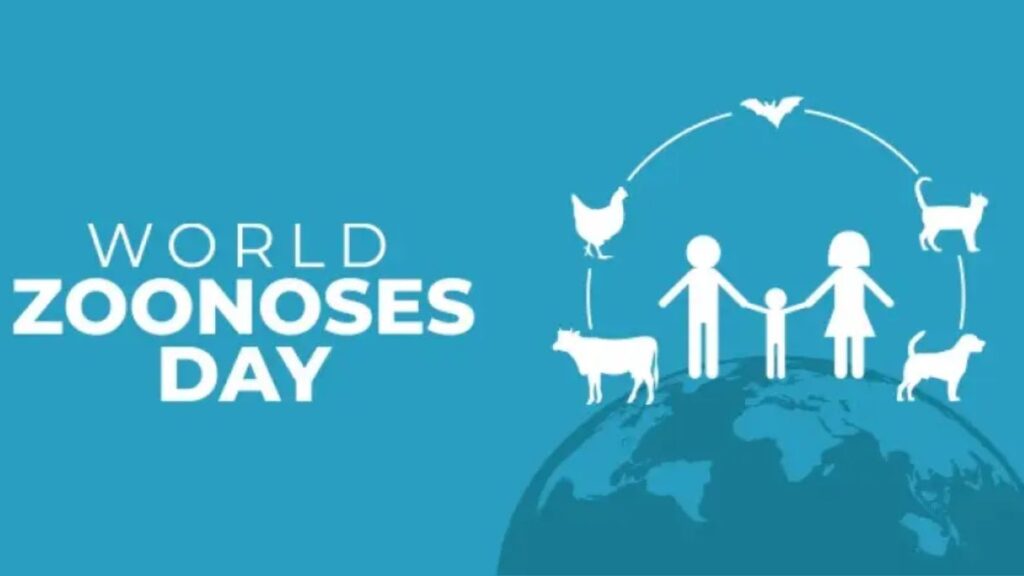Category: Health & Awareness | Global Observances | Indian Current Affairs
Published by: IndianCurrentAffairs.com
Date: July 6, 2025
🌍 Introduction: Why World Zoonoses Day Matters
Every year on July 6, the world observes World Zoonoses Day to commemorate the scientific breakthrough that changed the course of global health—the successful administration of the first vaccine against a zoonotic disease by Louis Pasteur in 1885. The day aims to raise awareness about zoonotic diseases, which are illnesses transmitted from animals to humans, and emphasize the need for preventive healthcare, vigilant surveillance, and collaborative public health efforts.
In 2025, the theme for World Zoonoses Day is:
“One Health, One Future: Strengthening the Human-Animal-Environment Interface.”
🧬 What Are Zoonotic Diseases?
Zoonoses are diseases that are spread between animals and humans. These can be caused by bacteria, viruses, parasites, or fungi and can occur through:
- Direct contact with infected animals
- Consumption of contaminated animal products
- Insect bites (e.g., ticks or mosquitoes)
- Environmental exposure
Some common zoonotic diseases include:
- Rabies
- Brucellosis
- Anthrax
- Bird flu (Avian Influenza)
- COVID-19 (believed to have zoonotic origins)
- Ebola
- Leptospirosis
📈 Rising Threats in the Modern World
Due to factors like urbanization, deforestation, climate change, and increased animal-human interactions, zoonotic disease outbreaks are rising in frequency and impact. According to the World Health Organization (WHO):
- Over 60% of emerging infectious diseases are zoonotic in origin.
- 75% of new human pathogens discovered in the last 50 years originated from animals.
The recent COVID-19 pandemic and outbreaks of diseases like Nipah and avian flu in India serve as urgent reminders of the zoonotic threats to global health security.
🔍 Importance of the “One Health” Approach
The 2025 theme focuses on One Health, a globally recognized strategy that emphasizes the interconnectedness of human health, animal health, and the environment. Collaboration between veterinarians, physicians, environmental scientists, and policy makers is essential to detect, prevent, and respond to zoonotic threats effectively.
Key areas under the One Health framework include:
- Disease surveillance across species
- Vaccination campaigns in humans and livestock
- Safe food practices and hygiene
- Biodiversity conservation
- Antibiotic resistance control
🧪 Global and National Initiatives
🏛️ India’s Measures:
India’s Ministry of Health and Family Welfare, along with the Indian Council of Medical Research (ICMR), has been actively working on:
- Zoonotic Disease Monitoring Units in collaboration with state governments
- Rabies Elimination Programs with mass dog vaccination drives
- Nipah Surveillance Programs in high-risk zones like Kerala
- Collaborations with veterinary departments under National One Health Mission
🌐 Global Actions:
- WHO, FAO, and OIE work jointly to strengthen zoonoses control systems
- World Bank and UNDP support funding for One Health initiatives in developing countries
- Global research partnerships for early-warning systems and vaccine development
📢 Awareness Activities on World Zoonoses Day
Across India and the world, World Zoonoses Day 2025 is being marked by:
- Free vaccination camps for pets and livestock
- Public awareness rallies in rural and urban health blocks
- Workshops for students, veterinarians, and medical professionals
- Social media campaigns using hashtags like #ZoonosesDay2025 and #OneHealthOneFuture
- Educational webinars and panel discussions hosted by medical colleges and NGOs
✅ Conclusion: Prevention is Better Than Pandemic
World Zoonoses Day 2025 serves as a powerful reminder of the delicate balance between humans, animals, and the environment. Strengthening surveillance, investing in research, and promoting behavioral change through education are crucial to protect our future from zoonotic threats.
As we move toward a health-secure world, let’s support cross-sectoral collaboration, raise awareness, and build systems that prevent the next outbreak before it begins.
For more verified updates on health observances, science breakthroughs, and policy developments, visit IndianCurrentAffairs.com.

